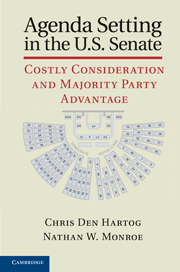Book contents
Preface
Published online by Cambridge University Press: 07 October 2011
Summary
Discourse regarding the contemporary U.S. Senate bemoans the legislative paralysis that is perceived to be endemic to the chamber and the adverse effects of the paralysis on national policy making. The sources of this perception are plain to see. News coverage of the Senate is rife with stories of hostile speeches, petty bickering, and partisan warfare, and often emphasizes the role of filibusters and holds in facilitating deadlock. From another perspective, however, this characterization is puzzling; the current Congress (the 111th) has enacted several major, controversial policies, including a massive economic stimulus, a far-reaching health care overhaul, and a sweeping reform of the financial system. How could a Congress producing such major changes be seen as gridlocked? One goal of this book is to reconcile these disparate views by explaining how obstruction and policy making exist side by side in the Senate.
Another goal is to address a similar and closely related puzzle that exists among Senate scholars: we all know how easy it is for an individual senator or a small group of senators to tie the chamber in knots, and we all know that the majority wins divisive policy battles. But we do not know how to square these seemingly contradictory beliefs, which are at the heart of many debates about the Senate.
In a sense, our involvement in this debate began on May 24, 2001, when Senator Jim Jeffords announced that he was leaving the Republican Party to become an independent and would side with Senate Democrats on organizational votes.
- Type
- Chapter
- Information
- Agenda Setting in the U.S. SenateCostly Consideration and Majority Party Advantage, pp. xi - xviPublisher: Cambridge University PressPrint publication year: 2011



